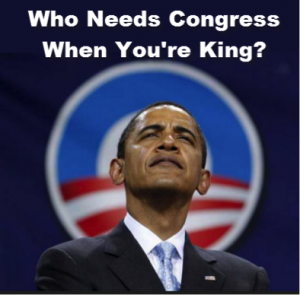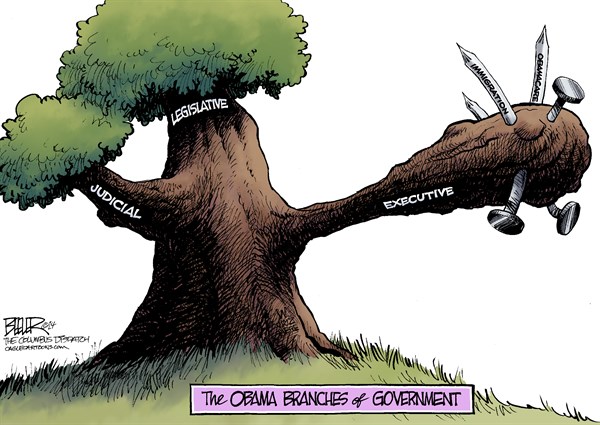Editor’s Note – Once again Andy McCarthy has nailed the issue – this time on Obama’s upcoming justification for unilateral action on immigration. To put it simply, prosecutorial discretion as a basis for Obama’s upcoming action is tortured and twisted logic.
On at least 25 occasions, Obama has been recorded telling an audience that he is not king and cannot do what he is now about to do. But alas, even the king can be wrong, all hail the King, for only he can change his mind at a whim and so too history and declare any edict as he pleases because he so much wiser than we the people.
A most arrogant, petulant, and infantile king he may be, but his royal highness is not pleased with how his subjects acted recently and he must strike back with an edict.
In a time when video is a daily thing for everyone and smart phones capture history so easily, don’t be fooled by your lying eyes and ears. That applies to anyone in his government including his paid advisors – after all dude, those videos were so last term, so old!
No, ‘Prosecutorial Discretion’ Does Not Justify Obama’s Lawless Amnesty
Obama’s planned action perverts the meaning of the legal doctrine.
By Andrew C. McCarthy
Can the president make fraud and theft legal? How about assault? Cocaine use? Perjury?
You’d have to conclude he can — and that we have supplanted the Constitution with a monarchy — if you buy President Obama’s warped notion of prosecutorial discretion.
Tonight, Mr. Obama will unveil his executive order granting amnesty to millions of illegal aliens. According to news accounts, the criminal-law doctrine of prosecutorial discretion is the foundation of the president’s legal theory. It is the source of what he purports to be his authority to decree that these aliens have lawful status, a power our Constitution gives only to Congress.
Obama is distorting the doctrine.
As I explain in Faithless Execution (and in columns and posts here, here, and here), prosecutorial discretion is a simple and, until recently, an uncontroversial matter of resource allocation. It merely holds that violations of law are abundant but law-enforcement resources are finite; therefore, we must target the resources at the most serious crimes, which of necessity means many infractions will go unaddressed.
I’ve highlighted the last part because it is the key to understanding how Obama’s amnesty perverts the doctrine.
As is always the case with a well-constructed fraud, Obama’s amnesty has some cosmetic appeal because it derives from some indisputable claims. In the American system, the power to prosecute belongs solely to the executive. Consequently, it is for the president alone to prioritize which law violations will be prosecuted and which will go unaddressed. Congress writes the laws but it has no power to compel the president to enforce them. And immigration offenses, like other law violations, are more plentiful than the police and prosecutorial resources available to carry out investigations, arrests, trials, imprisonment, and deportations.
So President Obama is entirely correct when he says prosecutorial discretion makes it perfectly lawful for him to target finite immigration-enforcement resources against illegal aliens who commit serious crimes while overlooking millions of illegal aliens who violate “only” the immigration laws (plus identity-fraud offenses typically committed as those aliens illegally stay and work here).
Obama, like all presidents before him, has that power. This may be infuriating to those who would like to see the crisis of illegal immigration tackled more energetically. That, however, is a policy dispute; a president is not lawless just because one disagrees with him on policy. If that was all there were to Obama’s order, it would be unremarkable.
But it is not unremarkable. Some simple examples illustrate the difference.
There are also many more fraud offenses committed in the U.S. than there are law-enforcement resources to prosecute them. So federal prosecutors, in an exercise of prosecutorial discretion, will often establish a fraud threshold amount — say, $10,000 – beneath which they will not open a case. But that does not mean you now have a right to steal $9,999.
If police in a big city are overwhelmed with violent crime and focus their attention strictly on murder, maiming, and rape, that does not mean it is now legal to go around punching people in the nose.
There are many thousands of trials, and in them it is not unusual for witnesses to lie. It would not be possible to launch a perjury prosecution against every person who gives false testimony under oath. But this necessary exercise of prosecutorial restraint is not a license to commit perjury — an invitation to lawlessness that would destroy the judicial system.
If the Justice Department decides it is going to target its anti-drug-trafficking resources against big time heroin and cocaine distributors, that does not mean that personal possession and sale of small amounts of those drugs is now legal — or, indeed, that the government should facilitate drug possession and sales.
Prosecutorial discretion means you are not required to prosecute every crime — which, since doing so would be impossible, is just a nod to reality. It does not mean that those crimes the executive chooses not to enforce are now no longer crimes. Prosecutorial discretion has never meant that the passive act of non-enforcement has the legal effect of repealing criminal laws enacted by Congress. And it has never even been suggested, because to do so would be absurd, that under the doctrine of prosecutorial discretion, the executive decision not to prosecute certain crimes means the people who commit those crimes should be rewarded for committing them. That, of course, would only encourage others to commit them on a more massive scale.
Yet that is President Obama’s theory. He is claiming not only the power to determine what immigration laws get enforced and which illegal immigrants get prosecuted — power he unquestionably has. He also claims the power to declare (a) that criminal acts are somehow lawful — that illegal aliens now have a right to be here — just because Obama has chosen not to prosecute them; and (b) that those who engage in this unprosecuted activity will be rewarded with benefits (lawful presence, relief from deportation, work permits, etc.), as if their illegal acts were valuable community service.
That is an utter perversion of prosecutorial discretion and a blatant usurpation of congressional power. Only Congress has the power to repeal criminal laws and confer positive legal benefits on non-Americans.
As you listen to the president try to explain himself tonight, you are going to hear a lot about how his plan is just a sensible exercise of prosecutorial discretion — how he is just using the sparse resources Congress gives him to enforce the law in more efficient ways. It will sound unobjectionable — even appealing.
But understand, it will be lawless and an invitation to waves of law-breaking. Obama is not merely prioritizing crimes; he is equating his non-enforcement of congressional statutes with the repeal of those statutes. He is not merely ignoring some lawbreakers so he can pursue others; he is declaring that categories of non-Americans of Obama’s unilateral choosing have a right to break our laws and be rewarded for it.
That is not prosecutorial discretion. It is a lawless betrayal of the president’s constitutional duty to execute the laws faithfully.
— Andrew C. McCarthy is a policy fellow at the National Review Institute. His latest book is Faithless Execution: Building the Political Case for Obama’s Impeachment.



